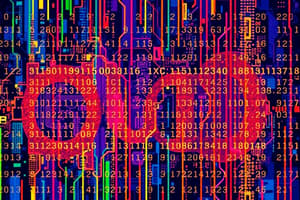Podcast
Questions and Answers
Which of the following is true about BIOS?
Which of the following is true about BIOS?
- It is firmware stored in ROM (correct)
- It is stored in RAM
- It is a type of storage device
- It is a type of CPU execution mode
What is the purpose of a system call?
What is the purpose of a system call?
- To provide interfaces for accessing hardware
- To manage memory allocation
- To request a kernel to perform a service (correct)
- To run application software
What is the difference between volatile and persistent storage devices?
What is the difference between volatile and persistent storage devices?
- Volatile storage devices are more expensive than persistent storage devices
- Volatile storage devices are used for long-term storage, while persistent storage devices are used for short-term storage
- Volatile storage devices are faster than persistent storage devices
- Volatile storage devices retain data even when power is off, while persistent storage devices do not (correct)
Flashcards are hidden until you start studying
Study Notes
Introduction to Operating Systems and System Calls
- An operating system (OS) manages computer hardware and application software, and provides interfaces for both to access hardware and run programs.
- OS manages memory/disk allocation, process scheduling, and peripherals control.
- There are two types of storage devices: volatile (registers, cache, RAM) and persistent (HDD, SSD, USB, optical drives).
- BIOS is firmware stored in Read-Only Memory (ROM) chip.
- CPU instruction consists of two parts: Operation Code and Operands.
- There are two CPU execution modes: Kernel mode and User mode.
- Modern computers implement CPU execution modes through protection rings that provide different privilege levels represented as numbers.
- A Dual-Mode OS uses two modes of CPU operations: Kernel/Privileged/System mode and User/Non-Privileged mode.
- Linux programs are stored in /bin/ or /sbin directories, and can be run by typing the name of the program if the program path is included in the PATH Variable.
- Every process in Linux is provided with three open streams (files).
- Two ways to send notifications between CPU and I/O devices are Polling and Interrupts.
- A system call is a mechanism by which a request is made to a kernel to perform a service, and is generally invoked through wrapper functions in glibc library.
Studying That Suits You
Use AI to generate personalized quizzes and flashcards to suit your learning preferences.




